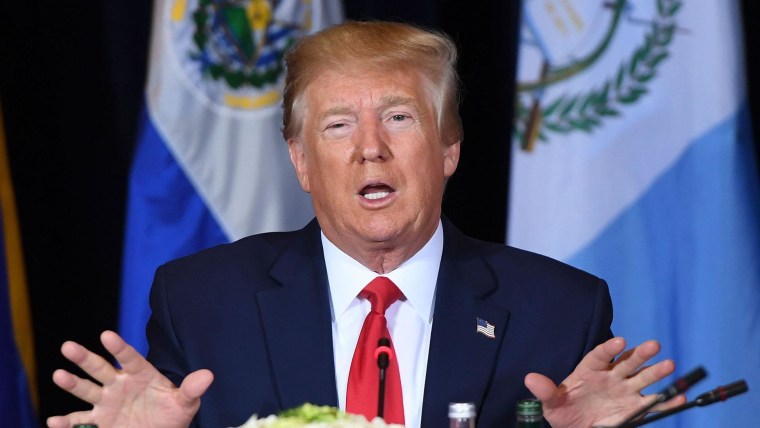After the public learned of the intelligence community's whistleblower and his/her complaint against Donald Trump, the president's initial response was to label the whistleblower a "highly partisan," based on rumors he'd "heard." Earlier this week, the Republican went a little further, suggesting people like the complainant "are trying to subvert our country."
As the Los Angeles Times reported, Trump went quite a bit further today, using the word "treason" in reference to the whistleblower and his/her White House sources.
"Basically, that person never saw the report, never saw the call, he never saw the call -- heard something and decided that he or she, or whoever the hell they saw -- they're almost a spy," Trump said."I want to know who's the person, who's the person who gave the whistleblower the information? Because that's close to a spy," he continued. "You know what we used to do in the old days when we were smart? Right? The spies and treason, we used to handle it a little differently than we do now."
The not-so-subtle implication of the comments -- an audio clip of which is now available -- is that Trump longs for the days in which Americans were "smart" enough to impose severe physical punishments on those he perceived as traitors.
This comes on the heels of comments in which the sitting president suggested Joe Biden is guilty of misdeeds that would warrant "the electric chair" if committed by a Republican.
Let's not forget that the intelligence community's whistleblower may yet provide testimony, raising questions about whether, and to what degree, Trump may hope to intimidate him or her. The same concerns relate to the whistleblower's White House sources, who may be considered witnesses to presidential wrongdoing.
As for Trump's "treason" reference, this comes on the heels of the president raising the prospect of a treason investigation into Google, which came on the heels of Trump accusing some in federal law enforcement of “treason,” which came a month after the Republican accused congressional Democrats of engaging in “treasonous” behavior.
As regular readers know, these weren’t isolated incidents. Last year, the New York Times published a rather extraordinary op-ed, written by “a senior official in the Trump administration,” describing a White House in which “many” officials work diligently behind the scenes to subvert Donald Trump. The president suggested the newspaper may have committed “treason” by agreeing to run it.
A few months before that, the president was so bothered by media coverage of his summit with North Korea’s Kim Jong-un that he described the reports as “really almost treasonous.”
And a few months before that, while whining that Democrats failed to applaud his State of the Union address to his satisfaction, the president said Dems “certainly didn’t seem to love our country very much” – and then raised the prospect of Democratic “treason.”
Now he's using the same word while complaining about those in his administration who helped expose his efforts to get a foreign government to help his re-election campaign.
